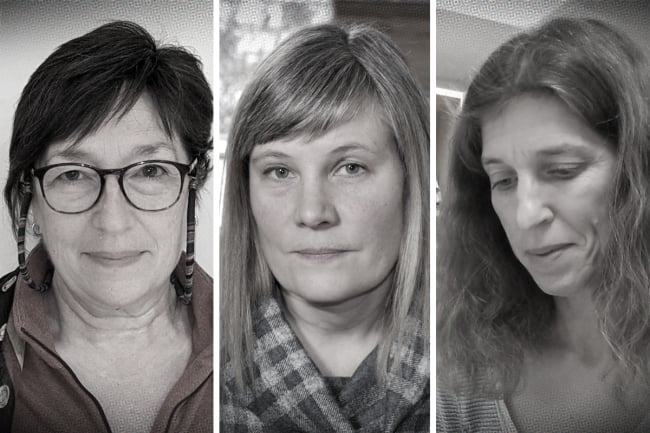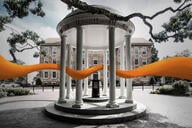You have /5 articles left.
Sign up for a free account or log in.

From left: Silvia Carrasco, Kathleen Lowrey and Elizabeth Weiss, three of the five would-be panelists for a now-canceled session.
At the American Anthropological Association’s major annual meeting next month, five women from four countries were set to discuss gender and sex—and to criticize other academics’ views on these topics.
In their session’s description, they argued, “While it has become increasingly common in anthropology and public life to substitute ‘sex’ with ‘gender,’ there are multiple domains of research in which biological sex remains irreplaceably relevant.”
“This diverse international panel brings together scholars from socio-cultural anthropology, archaeology and biological anthropology who describe why in their work gender is not helpful and only sex will do,” the description continued.
They titled this serious session something cheeky, with a Salt-N-Pepa song reference: “Let’s Talk About Sex, Baby: Why biological sex remains a necessary analytic category in anthropology.”
The association’s executive board has now canceled the panel, releasing a statement Thursday titled “No Place For Transphobia in Anthropology.” Ramona Perez, the association’s president, explained that after the preliminary program was published online Aug. 1, showing the panelists’ names, anthropologists from multiple fields raised concern.
The controversial panelists would’ve included Michèle Sirois, president of Pour les droits des femmes du Québec, whose organization has referred to gender-affirming surgeries as “mutilations” and taken other conservative positions, according to CBC/Radio-Canada. Another would’ve been Silvia Carrasco, a social anthropology professor at the Autonomous University of Barcelona who told Inside Higher Ed Tuesday that “trans children do not exist; they are being fabricated en masse by a very well-planned and financed initiative that has to do with transhumanism and the loss of women’s rights in democracy.”
Also appearing would have been Elizabeth Weiss, the departing San José State University professor who drew criticism for opposing reburying Native American bones and posing with a skull. Agustin Fuentes, a Princeton University anthropology professor, said platforming her could have offended Indigenous scholars.
The other two planned panelists were Kathleen Richardson, a professor of ethics and culture of robots and AI at the United Kingdom’s De Montfort University, whose work critiques “porn robots” and “porn dolls” from a feminist perspective; and Kathleen Lowrey, the associate professor of anthropology at the University of Alberta who organized the panel. Lowrey has received criticism for her views on transgender people and issues in the past, including quotes on her office door saying things such as “I have ignored the pronouns that were in your profile, and which you were probably hoping were important. Forgive me they were ridiculous so needy and so mad.”
The conference, in Toronto, is a joint meeting of the American Anthropological Association and the Canadian Anthropology Society. Perez said both she and her Canadian counterpart took the opposition to their executive boards, and the 17-member American board made the decision, while the Canadian board supported it.
“This decision was based on extensive consultation and was reached in the spirit of respect for our values, the safety and dignity of our members, and the scientific integrity of the program(me),” the two presidents wrote to the panelists last week. “The reason the session deserved further scrutiny was that the ideas were advanced in such a way as to cause harm to members represented by the trans and LGBTQI [members] of the anthropological community as well as the community at large.”
The “No Place For Transphobia in Anthropology” statement further compared the function of the “‘gender critical’ scholarship advocated in this session” to race science.
It’s not the first time the association has publicly weighed in on current social issues under pressure from members. Over the summer, its members approved a resolution to boycott Israeli academic institutions, citing the country’s treatment of Palestinians.
Lowrey told Inside Higher Ed the panel had scientific merit, despite what opponents say. She argues, for instance, that XXy is a chromosomal anomaly and not a third sex beyond male and female.
“They know perfectly well that this is an area of active contention, both in policy and scholarship, and they’re trying to suggest that somehow this was a panel about flat Earthism, or we think the moon is made of green cheese,” she said.
Fuentes said the panel presented “a boring argument, and it’s a straw man.”
“They had said in the initial abstract that anthropology is replacing biological sex with gender, and that makes no sense. I work on biological sex; tons of people work on biological sex,” Fuentes said. “It’s not culture or biology, it’s always both, and understanding those relations is the real challenge.”
Perez said, “It’s apparent that these are personal agendas … these are agendas that are more political than scientific.”
“It just didn’t belong. We’re not going to give them that platform,” she said.
Feeding a Controversy?
But sometimes dismantling one platform can build a bigger one.
Lowrey said the session was already set for Sunday, when “nobody’s going to come, not because of the topic, just because that’s when people are leaving the conference.” Now, news of the cancellation is making the rounds in conservative media, plus mainline publications like Newsweek and even The New York Times.
While Fuentes penned a letter, alongside two others, defending the panel’s cancellation, he said, “If nothing had happened, this would have been a lonely Sunday afternoon session that no one attended.”
The association didn’t reach out to the panelists with concerns about the session or ask for any changes.
Weiss—who’s currently with Heterodox Academy, a nonprofit that says it opposes scholarly “orthodoxy,” and on leave from San José State University ahead of her May retirement—said she would have been willing to add another panelist with different views.
Fuentes’s letter and the “No Place For Transphobia in Anthropology” statement criticized Weiss for using the term “sex identification” rather than “sex estimation” during her part of the written session description. The statement said forensic anthropologists use “sex estimation” because the process “is probabilistic rather than clearly determinative, and that is easily influenced by cognitive bias on the part of the researcher.”
Weiss’s section would’ve focused on determining sex using skeletal remains. She said she would’ve called it “sex estimation” if asked.
Countering accusations of transphobia, she noted this line for her part of the panel description: “In forensics, however, anthropologists should be (and are) working on ways to ensure that skeletal finds are identified by both biological sex and their gender identity, which is essential due to the current rise in transitioning individuals and their overrepresentation as crime victims.”
“We had people from four nations, represented different fields of anthropology, and who have very different views on their concerns about sex,” Weiss said, “and I can guarantee you that there are things that some of the other panelists would have said that I would have completely disagreed with it, so it’s not like we are a monotone people. This unifying theme is that biological sex is still important to consider, and not that gender is not important.”
“The question is if we’re going to erase the concept of sex,” she said. She said that if sex and gender are blended, it’s sex that gets eliminated from the discussion.
Carrasco, the Autonomous University of Barcelona professor, said she believes in gender—but her definition of the term is contentious.
“Gender is oppression,” Carrasco said. She said it’s “artificial inferiority and justification of subordination.”
She said she didn’t want to talk about adults, saying her research focuses on children and how transgender and queer ideas have been “kidnapping” coeducation, which should be a feminist tool for equality between women and men. “I’m a socialist, and I think how all these ideas have been subverting the notion of gender as oppression,” she said. She criticized, among other things, girls’ bathrooms allowing in transgender girls.
“If you don’t know what a girl is, how can you struggle against sex-based violence?” she asked.
Richardson, the United Kingdom researcher who focuses on “porn robots” and “porn dolls,” answered Inside Higher Ed’s questions via email.
“I appreciate the scope of my abstract may seem confusing,” she wrote. “But unfortunately due to the panel’s cancellation there will not be an opportunity to present these ideas to a community of peers. But in brief, I look at the breakdown in distinctions between people and property or so-called ‘flat ontologies’ and the harms this can provoke if there are no meaningful distinctions between different types of categories. Moreover, academic narratives in technologies have continually erased the sexed definition of women.”
The women’s letter objecting to the panel cancellation said Richardson’s written abstract “highlighted issues surrounding material disparities between the sexes in the tech industry that are being erased by counting men who identify as trans as women rather than by having more women enter the field.”
Richardson said she’s spent more than $1,000 on American Anthropological Association membership, fees and flights, which she would like reimbursed if the panel isn’t reinstated. The Foundation for Individual Rights and Expression has urged the American and Canadian associations to “reconsider this decision and to recommit to the principles of intellectual freedom and open discourse that are essential to the organizations’ academic missions.”
Sirois’s organization didn’t respond to requests for comment.
Lowery said she didn’t pick her fellow panelists for their politics.
“I picked them for their outspokenness—and the bench is not super deep,” she said. “Each of them have stuck their heads above the parapet, and that’s why they came to my attention.”
Perez, the American Anthropological Association president, said there are more than 900 sessions that made it into the conference, including 30 that deal with sex or gender.
Fuentes suggested the conference’s size might have something to do with how the panel got approved.
“Clearly, this fell through the cracks,” he said. “Very few ever get rejected from most conferences, and in this case that turned into a real problem.”




